Pentathlon Personalities: Meet Laura Asadauskaite, the iron woman who does it all for love
February 28 was a Wednesday this year. Just one more reason for Laura Asadauskaite to keep things low key. Her birthday had arrived just as the most demanding pre-season of her career was reaching its peak. In any case, the milestone was apparently not a major cause for celebration.
Asadauskaite was turning 40 but she is no normal 40-year-old. Then again, last year she was no normal 39-year-old, the year before that no normal 38-year-old. You get the picture. Asadauskaite has been extraordinary for so long now that it’s almost taken for granted. Her brilliance — and bloody determination — has been with Pentathlon so long that it’s part of the furniture.
When she lists the reasons why this year’s birthday was no extravagant celebration, you nod along. But deep down, you know the fact that it fell a week before the first UIPM Pentathlon World Cup of the season is probably why Asadauskaitė didn’t go overboard.
“When you think about it, it's been so many years. It's even hard to think about, hard to look at the passport,” smiles Asadauskaitė. “Still, in your heart, you feel young, strong, and capable of anything. As you think, so it is.
“And yet, in reality, well, there's this saying that you shouldn't celebrate turning 40. So that's why we celebrated very calmly, with family, had a peaceful meal with our favourite dishes. And training was from morning until evening. That weekend, we were already off to the World Cup in Cairo, so there wasn't much opportunity to celebrate there either.”
This, after all, is an Olympic year, which is an Asadauskaite kinda year. So of course, not the time for distractions. Paris 2024 looms over the entire world of elite Pentathlon yet you sense it looms and lingers longer over her. Simply put, she is Pentathlon’s iron woman. This summer’s Games will be the Lithuanian icon’s fifth. Debut in Beijing, golden glory in London, heartbreak in Rio de Janeiro, silver redemption in Tokyo. And now the City of Love with all of its romance and history but with plenty more history to be made.
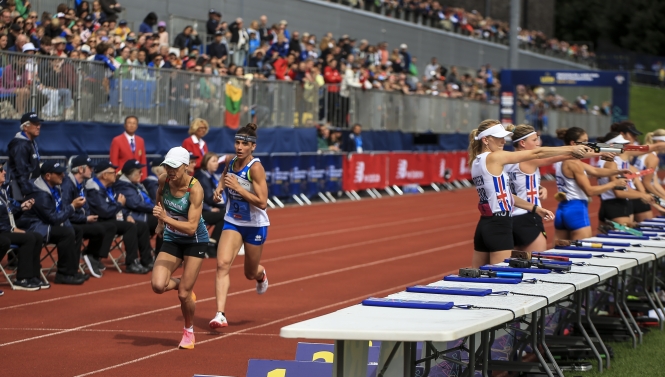
Asadauskaite persists in discussing Paris as a hypothetical and highlights a selection process the Lithuanian federation must make. But we know she’ll be there and in the process will become the first female pentathlete in history to make it to a fifth Games. Just one man, Australian Peter Macken, achieved the feat and he did so almost 50 years ago. Look a little further at what a victory in Paris could mean: it would leave Asadauskaitė as the most decorated pentathlete in history.
“Naturally, it's much harder now than it used to be, say, 10-15 years ago. But I already have my Olympic plan developed, a four-year cycle,” she says.
“I already know that I needed to take a break after the [Tokyo] Olympic Games. I know that afterwards there's such a recovery period for me, so I mustn't overdo it, and then there are still two years when I need to push myself to qualify for the [next] Olympics.
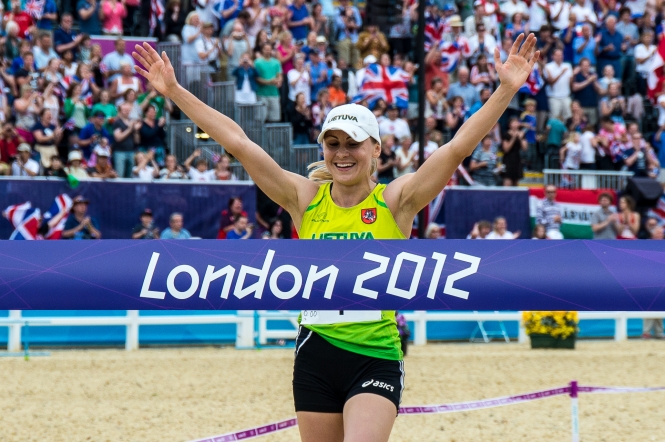
“About a gold medal, one must speak very cautiously. After all, our young athletes have grown significantly stronger now. Frankly speaking, I believe I definitely won't be able to win the gold. I think it would require a stroke of very good luck for me. I mean, I must do everything perfectly, and these few strong competitors must somehow fail. They must have bad luck.
"I think I can fight for any medal in my best shape. But, as I said, it's [also about] luck. And we know with horses, yes… It's possible to fight for any medal. As for what will happen, nobody knows. And in reality, I feel that now it will be much harder than it probably was.”
What’s remarkable though is that Asadauskaite has made all of this look easy. Since making her post-Tokyo return in April 2023 she has finished inside the top 10 in every event and is ranked sixth in the world. Talk to any of the leading lights of the new generation she refers to and the respect from them is so clear — but so too is the fear.
Her ability to hunt down leaders in the Laser Run is the stuff of legend. Hungary’s Michelle Gulyas spoke to UIPM News last month and said simply “if Laura is starting the Laser Run in fifth or sixth behind you, you’re in big trouble”.
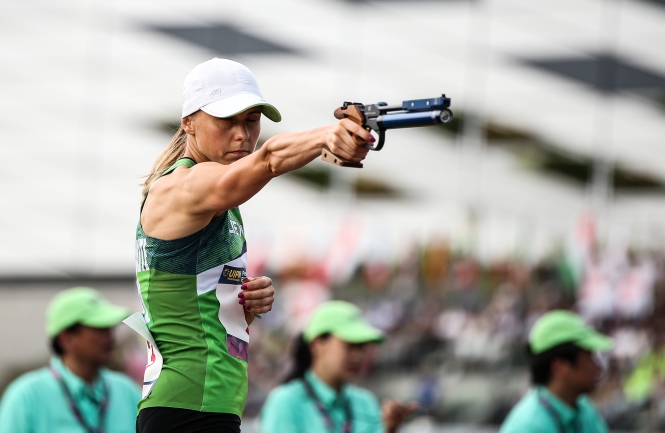
“I will repeat again that these girls are very strong, and I must say, competing with them right now is very difficult for me,” says Asadauskaite, who started the season with a 9th-place finish at UIPM 2024 Pentathlon World Cup Cairo.
“Apparently, they are often on the podium, and I'm just a little short. But I know perfectly well what I need to do in which disciplines and how, and I will strive to do everything possible. Everything must come together. All of my physical and mental preparation must be there, and it will be decisive if it's the Olympic Games.”
The Asadauskaite journey with the Olympics is a remarkable one. Of London 2012, she says “I realised my dream and I became that Olympic champion. Well, then, other dreams followed, the ones I wanted to fulfill, and they also came true.”
But what followed in Rio was a nightmare, when her chances were undone by elimination in the Riding discipline. “I thought, what should I do next? But it really touched me inside. That it's unfair. Fate is unfair, and why is fate like this?”
And so in Tokyo she challenged fate to a rematch. “I see that I have strength, and desire, and opportunity, and so, year after year, I came to Tokyo, and I managed to win a medal and prove that justice exists after all.”
At the arena and away from it she has proved so much. For 14 years she has balanced motherhood and elite sport and somehow made that look easy too. She and husband Andrejus Zadneprovskis, two-time Olympic medallist in Athens 2004 and Beijing 2008 and UIPM Executive Board Member for Media, welcomed daughter Adriana in 2010.
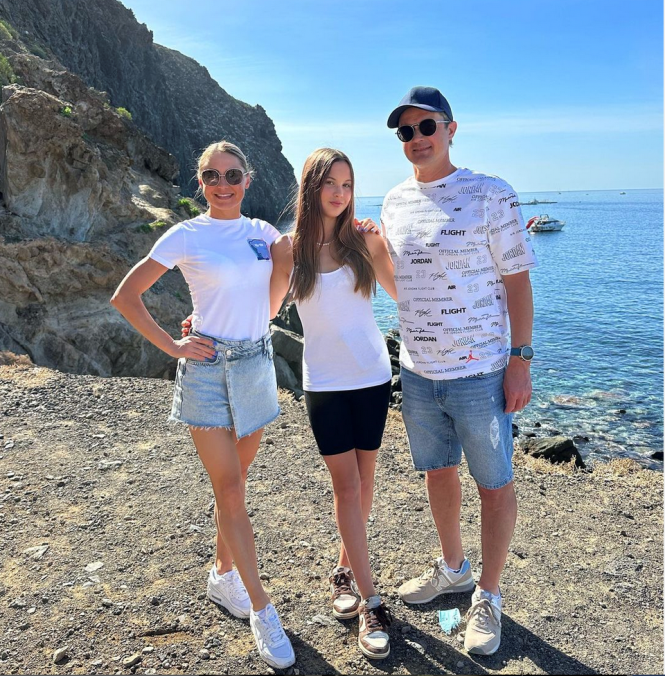
“Of course, this is a very difficult path - being a mother, raising children, and being a professional athlete,” she says. “I think it's still better for you when these things are separate. We can't devote 100% of our time to our children. We sacrifice our time, maybe even our attention. A medal has two sides.”
Adriana is following somewhat in her mother’s footsteps. Before she turned to Pentathlon, the younger Asadauskaite excelled nationally as a swimmer, while also having thoughts of figure skating, among many passions.
“My daughter has been involved in sports since childhood, she swims. But it will be her choice whether she wants to continue pursuing a sports career or go into another field. We don't pressure her, meaning she will choose for herself.”
And what about her ‘boy’? Marsalis Asadauskaite is a rusty brown cockapoo and a regular star on his mother’s social media accounts.
“It's like having a second little one for me,” she laughs. “My boy, so cute. It's always nice when you come and he's happier than anyone. It warms the soul, naturally, and you always think about him, not just about my daughter, but I think about my dog, too, as if they were my children.”
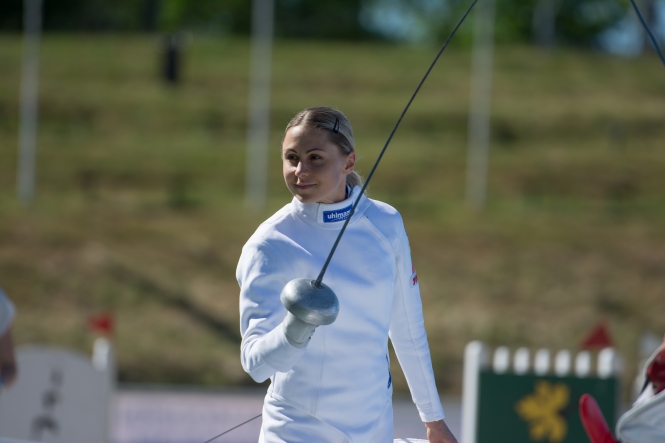
If not rude, it doesn’t feel quite right to discuss what retirement may eventually look like for Asadauskaitė. She smiles and says “maybe not soon” before outlining goals in the sports space, coaching, mentoring, campaigning.
If she could pass on her mentality to the next generation, Lithuanian sport would reap huge rewards. Whatever about keeping the body going at the very top this long, how has Asadauskaite stayed so damn hungry?
“Many people ask me this question, I've long thought about it. I’ve practically won everything possible. And for 30 years now I've been in sports, and it seems... Well, what pushes me to go on? Why am I here? Why do I still train? Still want to compete, participate, win medals?
“And the only answer I find - it's simply love for sports. There's no other name for it, it's just love.”
The City of Love, fittingly, awaits.
By Joe Callaghan



